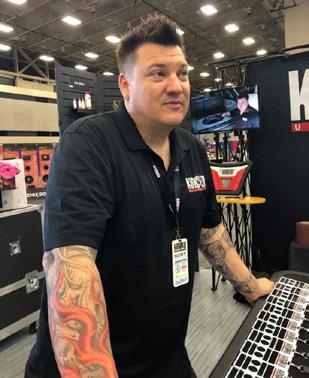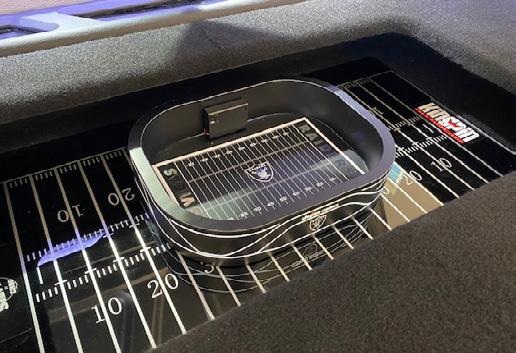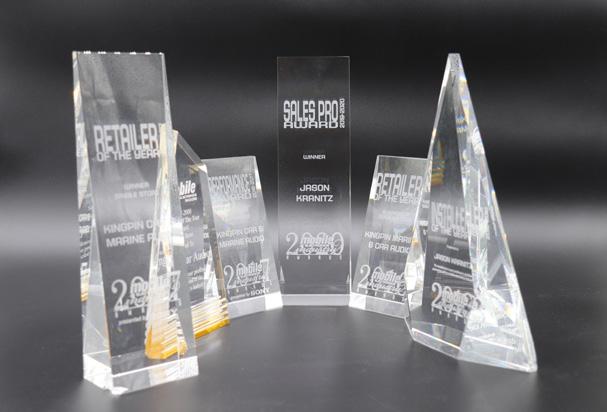
8 minute read
Sales Pro of the Year
Clean Slate
When COVID-19 disrupted business nationwide, 2020 Sales Pro of the Year Jason Kranitz chose to transform this challenge into an opportunity.
Words by Rosa Sophia
After Kingpin University and Kingpin Car & Marine Audio moved from Oregon to Las Vegas in 2019, owner Jason Kranitz quickly booked classes. When COVID-19 hit, he had to cancel classes and refund the students. Additionally, his landlord sold the building, and with no income from the school, his focus shifted to retail.
While searching for a new retail location, he’s had to conduct sales and installations out of his manufacturing facility. “No one knew me, I had no showroom—just pictures of previous work—and no one could even visit me because of COVID,” he explained, adding that while the business has been down in numbers, he doesn’t have much to compare it to because of the move. However, he added, “I feel that since we’ve started, we’re growing every month.”
Kingpin has been named Retailer of the Year in the past—twice—and has earned other distinctions such as Best Customer Experience. Also, Kranitz has held the Installer of the Year title. Once, he submitted materials for Sales Pro of the Year and wasn’t chosen. Although he hadn’t planned to attempt it a second time, COVID changed his mind because he felt the business was already uniquely structured to handle the challenge. For the last seven years, the shop has been appointment-only with locked doors, unlike many other retail locations. Kingpin University—the education branch of the business—opened its doors five years ago.
Kranitz finally decided to pursue the Sales Pro award because he felt other retailers would have a better understanding of the way Kingpin operates due to the unanticipated impact of the pandemic. “This year was my year,” he said, adding, “I just felt it.”
A Sales Strategy Uniquely Prepared for Crises
Kranitz, who has been in the industry for about 27 years, said it was almost as if Kingpin had been “built” for COVID. “A lot of guys called up and asked how we managed appointment-only, and what they should do. We started doing Thursday night ‘Corona Conversations’ to help people out and give them more information.”
The business is very fluid and changes as necessary, according to Kranitz, who stated that incorporating digital consultations via Skype and Facetime was something Kingpin started doing about three years ago. The reason? To handle customers’ objections.
“People weren’t comfortable with Zoom at the time, but now everyone is doing it because of the pandemic,” he said.
With a strict policy against offering estimates or quotes over the phone, Kranitz said the aim was to bring them into the store. Or, failing that, to do a live video consultation. The client might say they’re too busy to come in, he explained, but it doesn’t mean they are. “We’re project-based. All things being equal, the customer will buy the cheapest price. If I can show you value for the dollar, I may get you to buy.”
He added that a customer who is just looking for a flat number will come up with excuses to not visit the store. “If you combat that by saying, ‘No problem, we do digital consultations,’ it’s hard for them to say no,” because they don’t even have to leave their house. If they still say no, he added, “Then they’re just looking for a price.”
Currently, due to COVID, the business has switched entirely to digital consultations. Kranitz said customers will have the option in the future to either come in—when the new space is ready—or do a digital consultation if they prefer. During a video call, he will walk the customer around using his phone, show them products, answer questions and explain the process. Additionally, a digital consultation can be reviewed later on, to look at body language and ensure nothing was left out of the discussion—helping to inform future sales.
Pandemic Leads to Visiting Clients Outside the Shop
While digital consultations started pre-COVID, Kranitz said the practice of visiting the customer and their vehicle on-site began after the onset of the pandemic. Some larger projects are more
difficult to cover using a video call, and for a while, Nevada’s strict pandemic rules meant people couldn’t come in.
“We started offering to come to their house as part of the consultation,” Kranitz said, adding that clients have enjoyed the experience, as well as having the chance to show off their other toys. “Once we get into the new space, I see this continuing beyond the pandemic as a concierge service.”
He said the option would be offered only one day per week, and the client would be charged a flat fee to do an estimate on-site. “If they decide to go forward with it, great—if not, it covers our time spent going out there,” he added. Additionally, the shop has started picking up and delivering vehicles as a result of the pandemic, which Kranitz expects will also continue as an alternative for busy clients. “They’re willing to pay extra for that.”
Building Rapport and Closing the Sale
The sales strategy Kranitz utilizes, he said, is lengthy and begins with a phone call. “We always explain who we are and what we’re about, because if we don’t do that, then we’re just the same as everyone else,” he explained. Creating an experience the customer will remember is essential to the process. Kranitz recalled purchasing his first car in 1992, and how the dealership sent him a thank-you card and cookies, making him a repeat customer.
“We concentrate on making sure our clients have an experience they’ve never had before. Afterward, we have a lot of follow-up steps, all the way up to thank-you cards, a one-week call-back, to anniversary call-backs,” he said, adding that he puts a lot of special effort into product demonstrations, which can take anywhere from a half hour to almost two hours with a larger system.
Kranitz said he feels this is an important part of the sale. “It can be more important than the build itself, because we make sure they understand how to use it,” he added. If a customer comes in to buy a radio, he noted that he’ll pair the customer’s phone and make a phone call to demonstrate the equipment. “We don’t talk about it. We just do it. We walk them through how to get their music playing. I typically do it with my phone, and show them how it works and how to pair it. Then I delete all my stuff, and I have them pair their stuff. It’s a way to get them actively involved.”
As an appointment-only shop, demonstrations are scheduled at the end of the day so there are no interruptions, he explained. “When we schedule the demo, the cars are staged out front, everything is ready to go, we have the water bottles available, and everything has been gone over with a white glove so it’s all ready for pickup.”
His favorite product to sell, he said, is radar. “It’s always fun to install, and you’re selling technology that people really like. It’s one of those things that never comes back—clients really want it, and it’s a good revenue stream,” he explained.
Creating a Theme Build in a 1966 Chevrolet Caprice
Kranitz said being able to deliver a finished product to a customer is the best part of the process. His favorite recent sale and project was a theme build for a 1966 Caprice.
The Caprice received a Raiders theme build, and the project was completed for a local car dealership. “They wanted a tailgate piece,” Kranitz added. “We incorporated the theme through everything. It’s fun. It’s different.”





Becoming a Sales Professional
During the past year, Kranitz said he kept a journal of his experiences, documenting all the changes the business had to make in order to attract customers in a new place. He plans to teach a class on how to grow a business based on what he’s learned.
Kranitz feels we’re all salespeople—we just don’t know it. While his father was his biggest mentor in sales, he also sees Kingpin University students as mentors because they tend to be on the same page and work to find solutions to similar problems.
“I learned a lot about sales from my dad,” he said, adding that his father worked in sales as part of a construction crew. Although his father’s industry was based off the lowest bid, Kranitz said his dad never had the lowest bid, yet he was able maintain repeat clientele. This, he added, was about “follow-through and doing what you say you’re going to do.” Sales, Kranitz said, is pretty straightforward.
“Treat your client the way you want to be treated when you make a purchase. Just do that, and listen.” He emphasized that it doesn’t matter what the product is: The sales process is the same in every industry, in terms of being fair and handling everything properly. “My father taught me that repeat customers are your customers for life.”
He went on to encourage salespeople to listen to the client and never make assumptions. It’s important for a salesperson to embrace their position, he added. “Don’t hide it. There are a lot of guys out there who are embarrassed to say they’re in sales,” he said, explaining that a salesperson should focus on learning and absorbing as much knowledge as they can.
Kranitz feels that over-promising and under-delivering is a problem within the industry, a problem which shops and salespeople need to work on. How can salespeople and retailers deal with this issue? He believes the answer is rooted in education.
“We try to teach installers to become technicians. To become professionals. We need to do the same thing in sales,” he said, adding, “We need to start becoming sales professionals.”

By offering digital consultations, Jason Kranitz said Kingpin Car & Marine Audio was able to more effectively meet clients’ objections, while offering such an option also helped reveal whether or not a potential client was just looking for a price.











